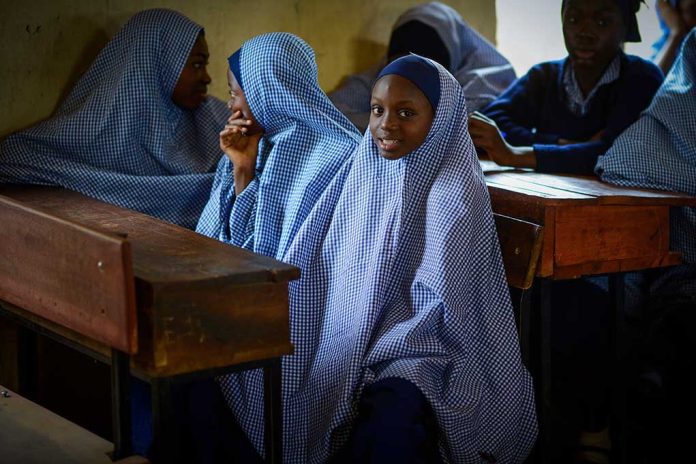
A recent decision by the Taliban to ban women from working in NGOs has led to widespread international condemnation, highlighting new geopolitical dynamics in Afghanistan.
At a Glance
- Taliban orders NGOs to suspend employing women citing hijab issues.
- The international response condemns the impact on humanitarian aid.
- New alliances form between the Taliban and Iran.
- Protests erupt against education bans on Afghan women.
Taliban’s Ban on Women’s Employment
The Taliban government has instructed all NGOs, both foreign and domestic, to halt the employment of women. The Taliban claims this move stems from “serious complaints” regarding the improper wearing of the Islamic headscarf by female staff. This development follows the Taliban’s previous restrictions on female students attending universities, which have ignited widespread protests across major Afghan cities.
The mandates come from Economy Minister Qari Din Mohammed Hanif, with threats of revoking NGO licenses for non-compliance.
This action is part of a broader clampdown on women’s rights since the Taliban’s return to power in 2021. This oppressive environment has been described by many in the international community as approaching “gender apartheid.”
The Taliban say they will close all national and foreign non-governmental groups in Afghanistan employing women.https://t.co/AxQ4RzkqsT
— euronews (@euronews) December 31, 2024
Global Reaction and Impact on Aid
The UN’s high commissioner for human rights, Volker Türk, has publicly condemned the Taliban’s latest restrictions. He voiced that the humanitarian situation in Afghanistan is dire, with NGOs playing a vital role in providing crucial aid. Türk urged the Taliban to reverse their decisions to avoid further deterioration of humanitarian efforts.
“No country can progress – politically, economically or socially – while excluding half of its population from public life,” said Türk.
The ban on women not only hinders aid efforts but profoundly affects the women themselves who rely on NGO jobs to support their families. Maliha Niazai, an NGO worker, expressed her distress concerning the announcement, pointing out its severe implications on her livelihood.
The Taliban announced over the weekend it will close all national and foreign NGOs in Afghanistan that employ women. https://t.co/CgSstYaR5C
— ABC News (@ABC) December 31, 2024
Evolving Geopolitical Dynamics
The Taliban’s relationship with Iran has come into the spotlight amidst these evolving geopolitical dynamics. Historically not aligned, the recent cooperation between the two entities is seen as potentially altering regional power structures. It has been reported that the Iranian regime supports facilitating connections between the Taliban and other militant groups like Hezbollah and Hamas.
“I am deeply alarmed at the recent announcement…this is absolutely the wrong path,” Türk said.
These shifts raise concerns about the stability of the region and the implications these alliances might have on the broader global geopolitical landscape. The strategic convergences suggest a more complex regional dynamic that policymakers around the world must navigate carefully.


